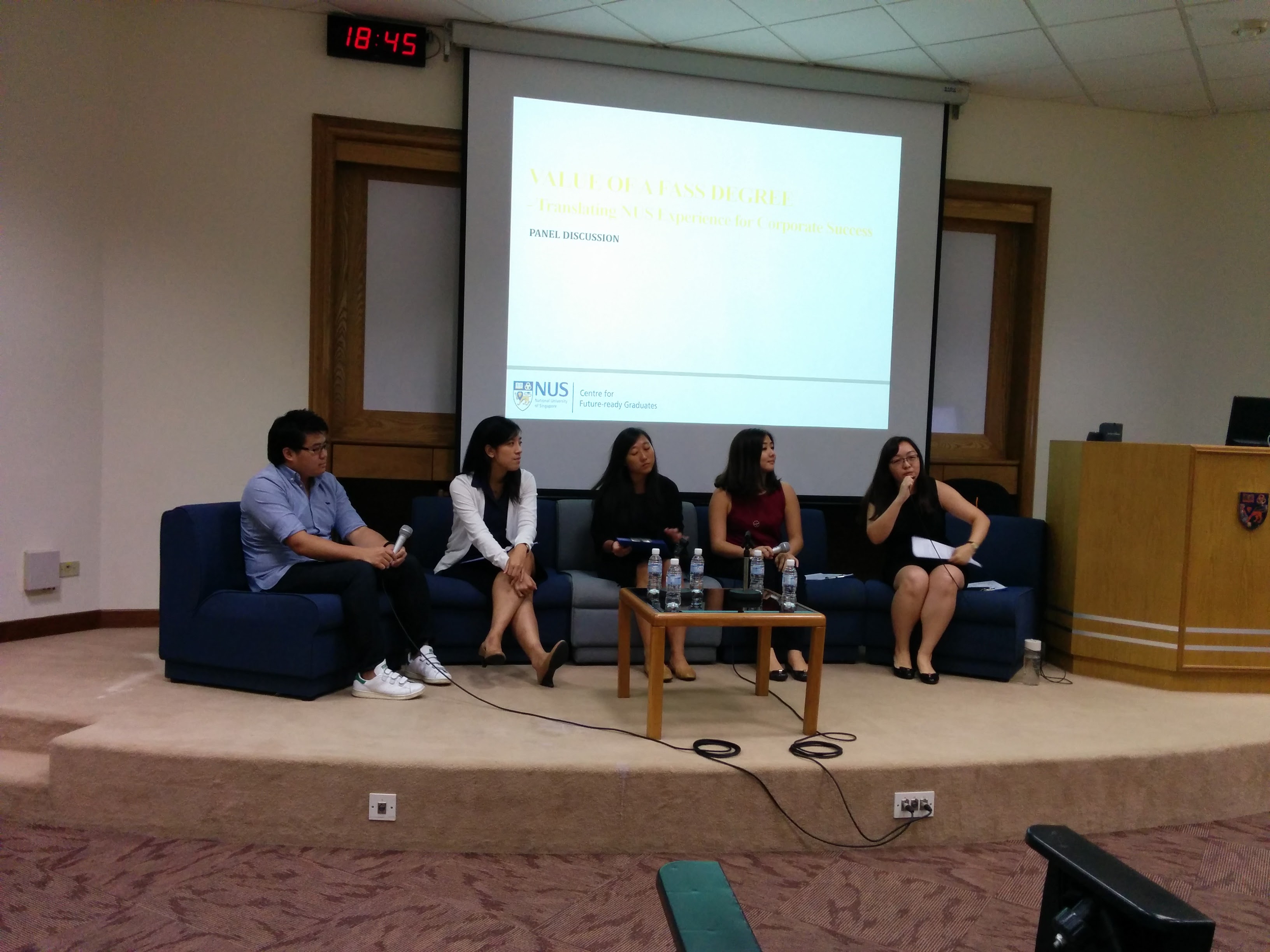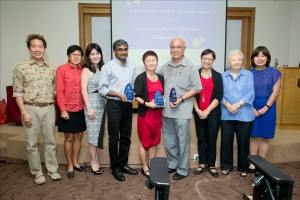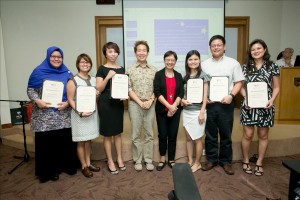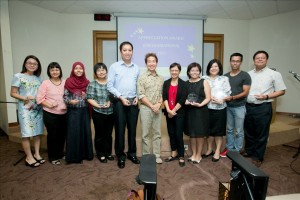Join us for this special Alumni-Student Networking Evening with your FASS seniors as they share their SCHOOL TO WORKPLACE TRANSITION journeys.
Register here!
Registration deadline: 3 Mar 2017, Friday
Join us for this special Alumni-Student Networking Evening with your FASS seniors as they share their SCHOOL TO WORKPLACE TRANSITION journeys.
Register here!
Registration deadline: 3 Mar 2017, Friday
On 5 November 2016, the Department of Japanese Studies and the Japanese Studies Alumni Group organised a dinner party at the NUSS Suntec City Guild House to celebrate the Department’s 35th anniversary. More than 60 former and present staff, alumni members and guests attended the special event. Participants were treated to an awesome night of good food, exciting games, and attractive prizes.
For more photos, visit the Department’s Facebook page!
Inaugural homecoming for the alumni’s was successfully organised by the NUS Environmental Studies Alumni (NUSESA) on 13 August supported by the NUS Office of Alumni Relations (OAR). The alumni had the opportunity to connect with each other including the BES Lecturers, Professor Leo Tan (Science’69), Associate Professor Victor R Savage (Arts and Social Sciences’72), Professor Matthias Roth, Dr Joanna Coleman and Dr Joseph Chun.
Prof Savage, whom represented OAR, urged everyone to meet regularly to keep up with energy of the alumni group. Prof Tan also mentioned that the alumni’s are the best ambassadors to spread the word on BES to members of the public.
Alumnus Magazine Oct-Dec 2016 Issue (Pg.35)
On 12 March, the Department of Sociology celebrated their 50 years of anthropology and sociology at the NUS Kent Ridge Guild House. The event started with a welcome speech by Professor Vineeta Sinha, the current Head of Department, followed by games and quizzes.
Alumnus Magazine Oct-Dec 2016 Issue (Pg.39)
The Annual Communications and New Media (CNM) Alumni Dinner was held for second time on 12 August at the NUSS Suntec City Guild House. The evening started with Professor Mohan Dutta, the Head of Department addressing the gathering, followed by the CNM Awards.
This year, the Outstanding Alumnus Award was given to Ms Audrey Tan, the co-founder of Angels of Impact and Playmoolah.
Alumnus Magazine Oct-Dec 2016 Issue (Pg.34)

Making career decisions is never easy. To partner you in this decision making process, the Centre for Future-ready Graduates, together with the Faculty of Arts & Social Sciences organized the “FASS Conversations: Design your Career” talk where questions were collated from you and your peers, categorized into 3 topics and addressed by the young Alumni:
Topic 1: Value of a FASS degree- Translating NUS experience for corporate success
Topic 2: Job Search Strategy
Topic 3: School to Workplace Transition
Young Alumni with experiences across the industries of Non Profit, Industry development, Marketing, Consulting, Public Relations and Tourism were present:
– Rachel, Assistant Manager, Resource Development and Communications at World Vision
– Shawn, Co-founder and Business Lead at Monocoque Service Design
– Soo Yee, Manager, Industry and Enterprise Development Group in F&B Services in SPRING Singapore
– Amanda, Senior Executive, Resort Marketing at Resorts World Sentosa
Those who were present valued the candid sharing from the young Alumni who spoke of the importance of acquiring experiences throughout their undergraduate years, being proactive to meet and speak with people from different backgrounds. Going on Student Exchange Programmes, securing local or overseas internships, participating in hall activities, CCAs and gaining volunteering experiences are just some examples of avenues where you can gain exposure to your fields of interest and acquire soft skills. One of the unique selling points of a FASS graduates are people and communication skills and ability to offer a different perspective on the issue at hand. This puts you in a better advantage in organizations where employees are required to work in teams or brainstorm ideas to creatively solve real world problems.
Some Alumni shared that it was a natural transition for them moving into their first job as things just fell in place nicely when they were searching for their first job. Having exposure to the industry and knowing people in the field greatly helped them in their decision making process and the transition. The Alumni present also candidly shared about the toughest interviews that they went through and emphasized on the importance of not only being prepared for the interview but also having the right attitude when presenting yourself to potential employers. Sharings on work culture, the make-up of colleagues in their work places and challenges faced in their roles gave the audience fresh insights on what to expect in the real working world. The Alumni were open and generous in their personal sharing and offered valuable tips. We look forward to organizing a subsequent installment of this well-received FASS Conversations talk!
To hear from HR Managers perspective on the topics covered, we invite you to the 3rd Instalment of the HR Perspectives – Recruitment Deciphered! Talk on 6 Apr, Wed, 4-6pm.
Take a glimpse into the “behind-the-scenes” process of job applications and understand from HR’s perspectives on what makes or breaks an application.
<Click here> to sign up for the event!
(Interview conducted by Department of English Language & Literature undergraduate, Nigel Choo)
Mei Fong graduated from NUS with a Bachelors of Arts (Hons.) in English Literature in 1997. She began her career as a journalist at The New Paper, then pursued a Masters in International Affairs at Columbia University before joining the Wall Street Journal as a correspondent in 2001. Her work as a correspondent at the Journal won her various accolades including a shared Pulitzer for her stories on China’s transformation ahead of the 2008 Beijing Olympics. After leaving the China bureau, she was on faculty at University of Southern California’s Annenberg School of Communications and is currently a fellow at the thinktank New America. Mei Fong was recently in town in December to promote her new book “One Child,” an account of China’s failed attempt at social engineering and its pervasive effects on the Chinese people.
Q: How did your undergraduate education in NUS influence you as a writer or journalist?
I think the honours year really helped me blossom as a writer by teaching me to read and write critically, and not just on Shakespeare or Joyce but also on popular culture. There was a great class Tim White taught on film critique I enjoyed immensely, and I also remember classes by professors Barnard White, Yong LiLan, Robbie Goh and Susan Ang vividly. Professors Goh and Ang in particular were influential because they encouraged my admittedly middle-brow tastes by lending me books on everything from science-fiction to Umberto Eco’s piece on James Bond. I knew I neither had the ability nor interest to write an epic canto, but their encouragement and examples showed me that it was possible–and indeed, necessary, to write intelligently about anything, even so-called “fluffy” topics.
Q: You have come a long way from being the 16-year old who was inspired by a meeting with Queen Elizabeth II to become a journalist and writer. Has there been a defining moment in your career thus far that you could share with us?
Lots of them! One was getting into a program to encourage creative writing that was sponsored by the Ministry of Education, when I was at Raffles Junior College. The program paired us up with mentors, and my mentor was the neurosurgeon and writer Gopal Baratham, who was a kindly influence. Gopal used to invite us mentees to the Tanglin Club for tea, and was generous about introducing us to the movers and shakers of Singaporean literary society. Imagine being a scrubby teenager and meeting folks like David Marshall and Catherine Lim. All these encounters inspired me, made me think there’s more to life than a 9-9 existence as an office peon.
Q: What inspired the writing of “One Child”?
I’d been reporting on China for several years, and the one-child policy was one of the most interesting and fascinating policies that really shaped Chinese society. At first, as a city dweller, it seemed as if the policy really only affected those in rural areas, who were more subject to its excesses, like forced abortions and sterilizations. Such things didn’t happen to educated women in cities. But over time, I came to realize it really shaped a lot of things for everyday Chinese, things like who you date, the jobs you choose, and how you die. But the key for me came when I was reporting on the 2008 Sichuan earthquake, China’s biggest natural disaster in three decades. A lot of the children killed in the earthquake were only children, because the area near the earthquake’s epicenter had actually been a test pilot program for the one-child policy, before they launched it nationwide in 1980. Because of the coming Olympics, Beijing moved in ruthlessly to suppress dissent and parental concerns over the nature of these deaths–many in poorly built, “tofu” schools–and so, the earthquake became not just an illustration of the damaging effects of a natural disaster, but also exposed the great hurts inflicted by that unnatural disaster, the one child policy. While I was in the midst of reporting on all this, including taking a physically taxing journey with migrant workers, I discovered I was pregnant. I subsequently had a miscarriage. That brush with parenthood, and the pain of the loss, was a trigger for me to examine some of the issues raised in the book. Why do we want to have children? What happens when that desire is thwarted by nature or government fiat?
Q: Who should read “One Child” and why?
Anyone who’s interested in China, in the kind of dystopian worlds envisioned by Orwell and Huxley, anyone who’s interested in journalism, anyone contemplating the costs of parenthood, anyone with a uterus.
Q: Finally, do you have any advice for our undergraduates?
My advice is to those contemplating creative careers, in the arts, in writing, in journalism, filmmaking–all the so called “unsafe” jobs that your parents are horrified by. There are a million obstacles, but if you really want to do this, then YOU can’t be the first obstacle, you’ll never get anywhere. To those who want to go into it, I say, Find a Way.
And for those who’ve had some success in these fields, I say, Make a Way.
For a more comprehensive Q&A with Mei Fong, head to http://www.meifong.org/author-qa/ where she responds to questions about “One Child” in greater depth.
Three distinguished alumni from the Department of Social Work – Ms Koh Wah Khoon, Dr S Vasoo and Mr Udhia Kumar – were the inaugural recipients of the Ann Wee NUS Social Work Alumni Award.
The Awards were given out on 22 September 2015 at an event held in conjunction with the annual Appreciation Tea for the Department’s Field Educators.
The Award, launched at the Faculty’s 85th Anniversary Dinner celebrations in November 2014, recognises alumni who have made major contributions to the social work education and practice.
It was also affectionately named after Mrs Ann Wee, the longest serving Head of Department of Social Work, who has inspired many with her selfless contributions to the sector. Dr Rosaleen Ow, Head of Department of Social Work, says, “the award is for alumni with a similar spirit to Mrs Wee who ‘serves without seeking rewards, give without seeking recognition’, in their work for more than 20 years.’”
One of the recipients, Ms Koh Wah Khoon, Senior Director at Singapore Children’s Society Family Service Centre (Yishun), dedicates her award to the people she has had the pleasure to work with namely Singapore Children’s Society, other social service practitioners, donors as well as supporters.
On her hopes for the social service sector in Singapore, Ms Wah Khoon acknowledges that social problems and sufferings will always be present in the society.
Despite that, she hopes the “social service sector would keep its ears to the ground so as to stay relevant to the changing needs of our people. That social service practitioners remember that social work is the gift of self, involving person to person transactions in order to bring about desired outcome for our clients.”
Dr S Vasoo, Associate Professorial Fellow at the Department, shares his sentiments about the sector as well. In essence, he feels that there is a need to adopt a more preventive and developmental approach while dealing with client populations as there is a tendency for social workers to take on a remedial approach instead.
“Such an orientation does not help to deal with the prevention of human breakdown,” he says.
He suggests that “It will be cogent for our human service professionals to help individuals and families to be inoculated with good human values, social skills and to be encouraged to acquire relevant industrial skills.”
Additionally, contributions can be more effective when more helping hands are involved in community development and community building.
Lastly, the current social work curriculum should be strengthened to equip trainees with invaluable skills such as the ability to anticipate social issues and problems to ensure a more dynamic social work profession.
“In understanding and analysing these aspects, they can develop a clearer sense of service direction for their organisations and make in-roads into areas where there are potential needs to be met and take proactive steps to tackle them,” he says.
Mr Udhia Kumar, Executive Director at Thye Hua Kwan Family Service Centre @ Tanjong Pagar, looks forward to more respectful sharing sessions with the Southeast Asian region and beyond.
“We should propagate or come up with our own indigenous models to uplift the community as the social service sector in Singapore is truly a unique one. We can share this knowledge or approaches with other nations who need not necessarily emulate us but adapt the approaches in a way that best benefits them. Likewise, we can also learn from other nations and I look forward to more of such sessions in the future,” he says.
The celebrations concluded with an Appreciation Tea for the field educators. Certificates and acrylic awards were also presented to various field educators and organisations for supervising students at the Department. Click here to see the full list of recipients.
Congratulations to all the winners!


